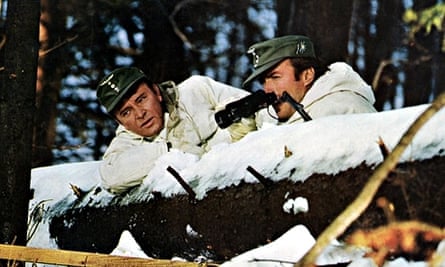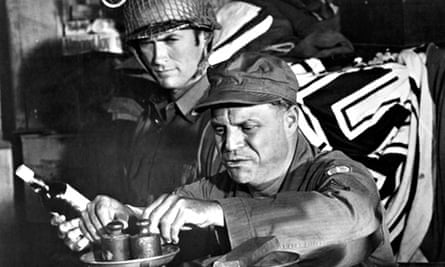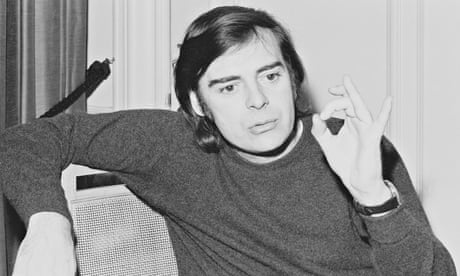Brian G Hutton, who has died of heart failure aged 79, directed Where Eagles Dare (1968) and Kelly's Heroes (1970), second world war pictures starring Clint Eastwood that are among the most popular films ever made. In these two huge box-office hits, Hutton demonstrated that he could handle action sequences with aplomb and coax nuanced performances from his actors within the limited confines of adventure movies.
In the implausible plot of Where Eagles Dare, Richard Burton and Eastwood play allied soldiers parachuted into a Gestapo stronghold and posing as German officers to rescue an important prisoner. Written by Alistair MacLean as a vehicle for Burton, the big-budget film is pure rollercoaster entertainment, superbly photographed in Panavision in the Austrian Alps, and adroitly using a daredevil team of stuntmen, led by the former cowboy Yakima Canutt, which prompted Eastwood to call the movie Where Doubles Dare.
Eastwood was paid $800,000, and Burton got over a million dollars and a share of the huge profits. Hutton made less, but the film gave his directing career an enormous boost.

Hutton, who was born in New York, started out as an actor, studying at the Actors Studio. Dark and handsome, he landed bit parts in films and television series from the age of 19, and the leading role as a gambler who wins a nightclub in Roger Corman's Carnival Rock (1957). He appeared in Gunfight at the OK Corral (1957) and King Creole (1958), starring Elvis Presley, and in Last Train From Gun Hill (1959) was one of a pair of drunken cowhands.
But most of his acting work was in TV westerns such as Gunsmoke, Rawhide and Laramie. He was also in a couple of Alfred Hitchcock Presents… in one of which, The Big Kick (1962), he played a groovy beatnik musician. After a few lean years, he re-emerged as a director.
Wild Seed (1965), the result of Universal Studios' policy of encouraging young talent, was a watchable road movie following two lonely young people (Michael Parks and Celia Kaye) across the US. It was shot in black and white in three weeks, on a very low budget, with some of the dialogue improvised .
The Pad and How to Use It (1966), based on The Private Ear, a one-act play by Peter Shaffer, suffered by comparison with Richard Lester's hit The Knack of the previous year, but Hutton was given a chance to prove himself as an action director at MGM with Sol Madrid (aka The Heroin Gang, 1968). Moving at a lively pace, and with good location photography, it followed the adventures in Mexico of an undercover drug agent (David McCallum) and helped convince the producer Elliott Kastner that Hutton was the right man for the job of Where Eagles Dare.
Getting Burton to approve the relatively unknown young director was not easy but Kastner told Burton that "Brian Hutton had a lamp in his gut like a beacon: just put him in a room and Flash!" Hutton recalled that the Welsh-born Burton accepted him because he was of Welsh descent himself.

The triumph of Where Eagles Dare led quickly to Kelly's Heroes, about a bunch of maverick GIs who decide to steal a hoard of German gold behind enemy lines. A worldwide hit, it was envisioned as more than an enjoyable caper by both Eastwood and Hutton, in tune with the anti-Vietnam war sentiment in the US at the time. The studio ordered drastic cuts, although the long-haired proto-hippy Donald Sutherland survived.
Hutton then gave Elizabeth Taylor free rein in Zee and Co (aka X, Y and Zee, 1972) and Night Watch (1973). The first, based on an original screenplay by Edna O'Brien, contained abundant references to the turbulent marriage of Burton and Taylor. In Night Watch, Taylor is a woman driven out of her mind amid luxury possessions and surroundings. "It was good fun, but all I had to do was yell 'Action' and 'Cut-Print', because everybody was doing what they had to do anyway," Hutton recalled.
He gave up directing for seven years, until Columbia asked him to replace Roman Polanski, who had been charged with rape, on The First Deadly Sin (1980). Although Hutton keeps the thriller fairly taut, the film belongs to Frank Sinatra as a New York detective tracking down a serial killer.
Hutton's last film before retiring from show business was the routine High Road to China (1983), starring Tom Selleck as a first world war flying ace. He then went into property in Los Angeles.
He is survived by his wife, Valerie.

Comments (…)
Sign in or create your Guardian account to join the discussion